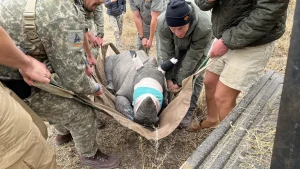 At first light, the rescue team from Sabi Sand Nature Reserve and team members of Care for Wild (the world’s largest rhino sanctuary dedicated to the rescue, rehabilitation and release of orphaned rhino) swiftly darted and moved the calf to Care for Wild’s intensive care unit, where he received 24-hour care, intravenous fluids and milk to stabilise his condition.
At first light, the rescue team from Sabi Sand Nature Reserve and team members of Care for Wild (the world’s largest rhino sanctuary dedicated to the rescue, rehabilitation and release of orphaned rhino) swiftly darted and moved the calf to Care for Wild’s intensive care unit, where he received 24-hour care, intravenous fluids and milk to stabilise his condition.
After a tragic poaching incident in August left a 7-month-old rhino calf stranded for three days – hungry and afraid – the Sabi Sand Nature Reserve in South Africa launched a special rescue operation to save the little calf’s life. With high concentrations of hyenas and lions around, the team feared he would not survive another night – so, determined to keep him safe, they used several DJI Mavic drones to keep a watchful eye on the orphan from 20m above –alternating drones as soon as batteries ran flat. In recognition of the enormous efforts to save the little orphan, Singita’s anti-poaching team leading the rescue asked to name him Mavic after the drones that saved his life.
Nature Reserve in South Africa launched a special rescue operation to save the little calf’s life. With high concentrations of hyenas and lions around, the team feared he would not survive another night – so, determined to keep him safe, they used several DJI Mavic drones to keep a watchful eye on the orphan from 20m above –alternating drones as soon as batteries ran flat. In recognition of the enormous efforts to save the little orphan, Singita’s anti-poaching team leading the rescue asked to name him Mavic after the drones that saved his life.
Inge Kotze, Head of Conservation Singita Lowveld Trust, says, “Mavic is both a story of heartbreak and hope – illustrating the tireless efforts, immense passion and dedication of remarkable teams”. We trust that he’ll thrive in the excellent care of his guardians, and we, as Singita Lowveld Trust, will continue to do everything we can to support their efforts in the fight for our rhino.
When security drones captured footage of the small rhino walking alone, it was already too dark for the rescue helicopter to fly. Apart from learning to trust his caregivers, one of his most significant milestones was finding comfort and companionship with two older rhino orphans at Care for Wild.
 As the poaching crisis continues, saving every endangered rhino is essential to secure the species’ future. The aim is to increase the sponsorship to see Mavic’s rehabilitation through to his eventual release into the wild, support other rhino orphans, and contribute to the species’ survival in South Africa. The total cost for the first year amounts to R233,000 and includes constant care, milk, feed, veterinary and staffing expenses. He has been rehabilitating and rewilding one rhino orphan for over three years, totalling R479,000 (or USD 26,434).
As the poaching crisis continues, saving every endangered rhino is essential to secure the species’ future. The aim is to increase the sponsorship to see Mavic’s rehabilitation through to his eventual release into the wild, support other rhino orphans, and contribute to the species’ survival in South Africa. The total cost for the first year amounts to R233,000 and includes constant care, milk, feed, veterinary and staffing expenses. He has been rehabilitating and rewilding one rhino orphan for over three years, totalling R479,000 (or USD 26,434).
One rhino orphan’s remarkable journey. The second year of weaning and supplementary feed costs R150,000, and the third, R96,000, is the final rewilding phase. He followed them everywhere and settled into his new rhino crash, where he would stay for up to three years. The Singita Lowveld Trust (Singita’s non-profit conservation partner in South Africa) sponsors Mavic’s first year of care. For the first 48 hours, a traumatised Mavic drank milk every 2-3 hours and slept deeply. Sponsoring Mavic to help save a species
Since then, his recovery has included many steps in the desensitisation programme.
Read the complete account of Mavic’s rescue and ongoing recovery at Care for Wild here.
We need your help
Every rhino counts. Each cow can produce up to eight calves in a lifetime, so it is critical to support the rehabilitation of orphaned rhinos to be released back into the wild.
Support the Singita Lowveld Trust as they help fund Mavic’s additional two years of care – and other rhino orphans who have suffered similar fates. Find out how you can become part of the positive change through this meaningful initiative and donate here: https://empowersafrica.org/partners/singita/
Watch the video of Mavic’s remarkable rescue operation here >
Written by: Willam Trevan




















